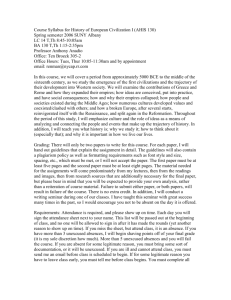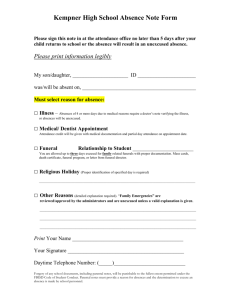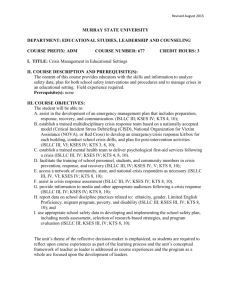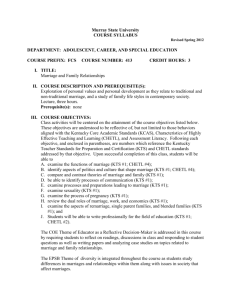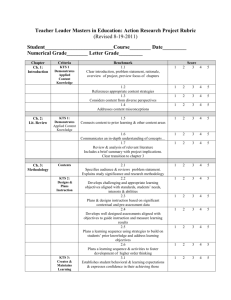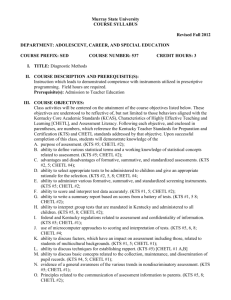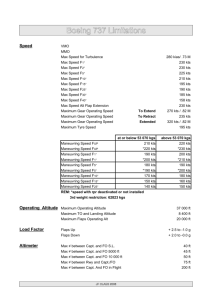Murray State University COURSE SYLLABUS Revised Fall 2011
advertisement
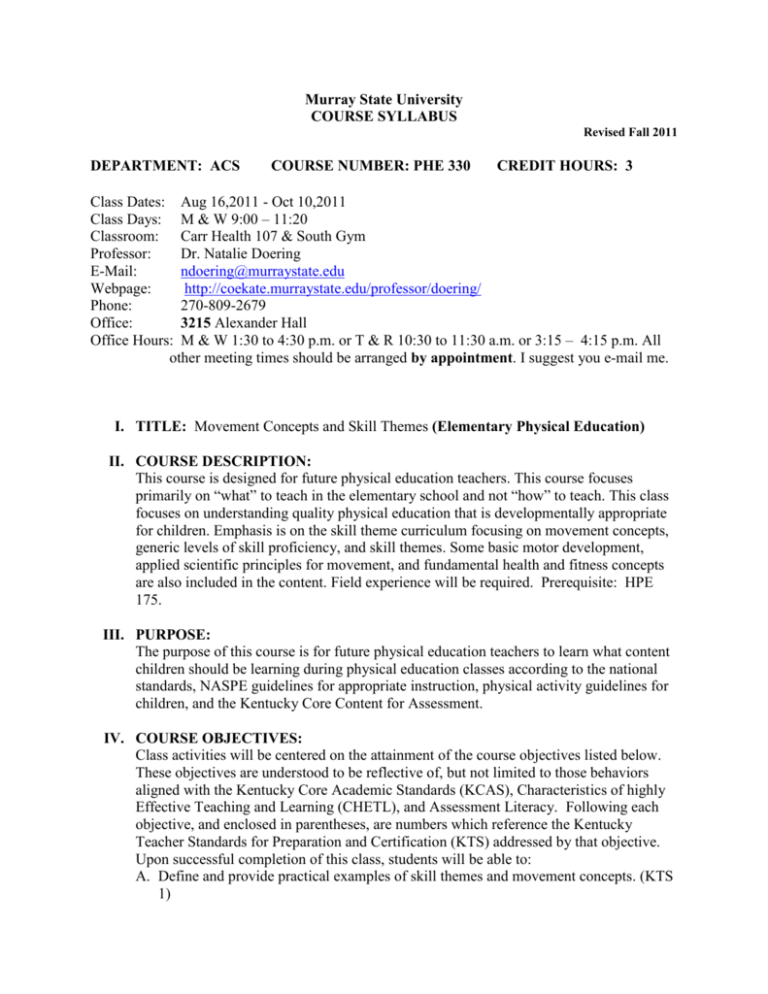
Murray State University COURSE SYLLABUS Revised Fall 2011 DEPARTMENT: ACS COURSE NUMBER: PHE 330 CREDIT HOURS: 3 Class Dates: Aug 16,2011 - Oct 10,2011 Class Days: M & W 9:00 – 11:20 Classroom: Carr Health 107 & South Gym Professor: Dr. Natalie Doering E-Mail: ndoering@murraystate.edu Webpage: http://coekate.murraystate.edu/professor/doering/ Phone: 270-809-2679 Office: 3215 Alexander Hall Office Hours: M & W 1:30 to 4:30 p.m. or T & R 10:30 to 11:30 a.m. or 3:15 – 4:15 p.m. All other meeting times should be arranged by appointment. I suggest you e-mail me. I. TITLE: Movement Concepts and Skill Themes (Elementary Physical Education) II. COURSE DESCRIPTION: This course is designed for future physical education teachers. This course focuses primarily on “what” to teach in the elementary school and not “how” to teach. This class focuses on understanding quality physical education that is developmentally appropriate for children. Emphasis is on the skill theme curriculum focusing on movement concepts, generic levels of skill proficiency, and skill themes. Some basic motor development, applied scientific principles for movement, and fundamental health and fitness concepts are also included in the content. Field experience will be required. Prerequisite: HPE 175. III. PURPOSE: The purpose of this course is for future physical education teachers to learn what content children should be learning during physical education classes according to the national standards, NASPE guidelines for appropriate instruction, physical activity guidelines for children, and the Kentucky Core Content for Assessment. IV. COURSE OBJECTIVES: Class activities will be centered on the attainment of the course objectives listed below. These objectives are understood to be reflective of, but not limited to those behaviors aligned with the Kentucky Core Academic Standards (KCAS), Characteristics of highly Effective Teaching and Learning (CHETL), and Assessment Literacy. Following each objective, and enclosed in parentheses, are numbers which reference the Kentucky Teacher Standards for Preparation and Certification (KTS) addressed by that objective. Upon successful completion of this class, students will be able to: A. Define and provide practical examples of skill themes and movement concepts. (KTS 1) B. Explain the need for generic levels of skill proficiency and how they are used in conjunction with skill themes to build a developmentally appropriate physical education curriculum for children. (KTS 1) C. Organize and create a developmentally appropriate progression for each of the skill themes and movement concepts. (KTS 1) D. Identify and provide appropriate movement tasks based on the observed skill level of children. (KTS 1) E. Explain the relationship of games, gymnastics, and dance to skill themes and movement concepts. (KTS 1) F. Describe the differences between a skill themes approach to children’s physical education curriculum and other approaches (traditional, movement education, fitness, physical activity; busy, happy, good). (KTS 1) G. Explain the inclusion of fitness concepts in the curriculum and how fitness concepts differ from fitness activities. (KTS 1) H. Define and provide practical examples of health and fitness concepts. (KTS 1) I. Write developmentally appropriate skill theme lesson plans using “content development” format (tasks/cues/challenges). (KTS 2) J. Develop a plan for involving classroom teachers in physical education instruction that is compatible with the program of the physical education specialist. (KTS 8) K. Develop and implement practical assessments with children as a way to check for understanding. (KTS 5) L. Teach small groups of children demonstrating a correct and developmentally appropriate use of the skill theme approach. (KTS 3 & 4) The COE Theme of Educator as Reflective Decision-Maker is included in this course by requiring PHE students to reflect on their teaching student learning as a result of their teaching during the lesson the PHE students taught. The EPSB theme of Assessment is touched on briefly in specific discussions related student learning in schools and assessment in physical education. Pre-service teachers will be required to assess their students and reflect directly on the student learning piece for the lesson. Learned societies from each discipline should be referenced by the preservice teacher. Kentucky documents, including SB1 Initiatives (e.g., Kentucky Core Academic Standards and Characteristics of Highly Effective Teaching and Learning) will be resources for all teacher candidates. V. CONTENT OUTLINE: A. Movement concepts – body, space, effort and relationships B. Skill Themes – throwing, catching, kicking, punting, dribbling, volleying, striking with paddles and rackets, striking with long-handled implements, travelling, chasing, fleeing, dodging, balancing, jumping and landing, transferring weight, and rolling. C. Skill Themes and Movement in Dance: Core Content: Elements of dance – time, force, flow; Dance Forms (AB, ABA); History and Culture of Dance, Purposes of dance: ceremonial, artistic, recreational D. Skill Themes and Gymnastics (rolling, transferring weight, balance, and flight) E. Skill Themes in Games (purpose of, history of, format or types, games for understanding approach (net/wall, invasion, target, combinations) F. Health, Wellness, Physical Activity, and 5 health-related Fitness principles–food pyramid, fitness pyramid, physical activity guidelines, and principles G. Applied Scientific Principles – generating force (length, lever, rotation), absorbing force (collecting objects), equal and opposite, extensions and force, preparatory phases and force, hand-eye developmental principles applied to young children such as “bend to absorb the force.” H. Senate Bill 1 Initiatives VI. INSTRUCTIONAL ACTIVITIES: Lecture/discussion, small group activities, videotape analysis, labs in the gymnasium, peer teaching, teaching elementary school children in a public school VII. FIELD, CLINICAL, AND/OR LABORATORY EXPERIENCE: Four hours of field experience is required. In this class, one field experience in the schools occurs through the Field Office. I will notify you as soon as I know the dates. You will teach at Mayfield Elementary school for 2 to 6 class periods depending on the number of students. We are transported by the Murray Field office and we go during class time. You must follow student teaching and field experience guidelines (dress, cell phones, hats, etc.) while in public schools. This is your future professional environment and expectations are high. Missing any fieldwork results in CLASS FAILURE & a Negative Flag. VIII. RESOURCES: A. Instructor webpages B. PECentral.org C. Journal Articles D. Videotaped Motor Skills E. Computer Centers F. Media and Resource Centers G. Library H. Additional educational websites as needed (AAHPERD, AAPAR) IX. GRADING PROCEDURES: Student grades are based upon their ability to successfully complete and participate in activities such as daily labs, in-class/group & individual activities, written assignments, field experiences in an elementary public school. Professionalism and dispositions are calculated into the final grade through item 4. 1. Daily labs, attendance, in-class discussions, individual & group activities 2. 8 to 10 Quizzes 3. Fieldwork & Written Work including lesson plans, assessments, teaching, & reflections, 30% 30% 20% 4. Professionalism & Dispositions (See Rubric) 20% (See how to earn Professionalism points on a separate Professionalism Page) Grades are earned based upon this scale: A – 94 B – 85 C – 75 D – 65 A = 94 % - Exceptional student: always prepared, completes quality work on time, comes to class on time, is fully engaged during class instruction, contributes to discussions, is inclusive and helpful in group work, preparation and clean-up time, plays nice with others! We in a profession that expects all teacher/leaders to be this type of person. B = 85% - Good student: Does what is asked but not more, does not always put forth best effort, work may be inconsistent (sometimes good sometimes not), has to be asked to help in group work, set up clean up etc. If you fall here you need to work on your professionalism and dispositions. Do you want to be a contributor to your profession or just a warm body? C = 75% - If you are not above average in your work ethic and professionalism you better start thinking about a different career! This level is NOT acceptable teacher professionalism. D = 65 % and below Not acceptable. ATTENDANCE POLICY: This course adheres to the attendance policy stated in the current MSU Undergraduate Bulletin. “An instructor may establish attendance policies for each class so long as they : (1) are clearly published in the course syllabus, (2) distinguish between excused and unexcused absences and (3) are consistent with university policies as outlined in this Bulletin. Excused absences fall into two broad categories: 1. Absence due to personal illness or death in the immediate family or other extraordinary personal circumstance. Faculty may require appropriate authentication or documentation. 2. Absence due to student participation in a University Sanctioned Event in which the student serves as a representative of the institution.” If you must miss a class, notify the instructor prior to the scheduled class. Excessive absences will result in a lowered grade in the course (see below). Your participation in learning is critical. I expect you to be in class every class period. Why? You learn during class time in my classes from the activities, discussions and each other. In a class that only meets 15 times including teaching two days at Mayfield you cannot afford to ever miss. You will learn a weeks worth of material in one class. There are always consequences for choices made. I do not allow for any unexcused absences in any course. If you have an unexcused absence the consequence is a ZERO for all work due and done that day in class including on-line quizzes. One unexcused absence will result in a dropped letter grade from where it stands. More than two unexcused absences (which would be the equivalent to two weeks of missing a traditional college course) will result in failing the course. University Sanctioned Events require paperwork turned in ahead of time. It is up to my discretion to excuse any other absences or not. See excused absences number 1 above. I require authentication or documentation and notification AHEAD of class for all excused absences. - You are expected to read the required readings for each class ahead of time and come to class prepared to participate and apply your learning. I do Not allow Make-ups for Quizzes or any written work – you must meet the deadline. I do NOT accept late work even if absent. Don’t even ask. Missing any fieldwork results in CLASS FAILURE & a Negative Flag. X. ACADEMIC HONESTY POLICY This course adheres to the academic honesty policy stated in the current MSU Undergraduate Bulletin. XI. TEXT AND REFERENCES Graham, G., Holt/Hale, S., & Parker, M. (2009). Children moving: A reflective approach to teaching in physical education. (8th ed.). New York: McGraw Hill. XII. PREREQUISITES: HPE 175 XIII. NON-DISCRIMINATION POLICY STATEMENT: Murray State University endorses the intent of all federal and state laws created to prohibit discrimination. Murray State University does not discriminate on the basis of race, color, national origin, gender, sexual orientation, religion, age, veteran status, or disability in employment, admissions, or other provision of services and provides, upon request, reasonable accommodation including auxiliary aids and services necessary to afford individuals with disabilities equal access to participate in all programs and activities. For more information, contact Director of Equal Opportunity, Murray State University, 103 Wells Hall, Murray, KY 42071-3318. Telephone: 270-809-3155 (voice), 270-809-3361 (TDD). XIV. FLAG SYSTEM/CONTINUOUS ASSESSMENT: Student progress is continuously assessed throughout the teacher preparation program. Appropriate professional characteristics and dispositions, in addition to academic achievement, are assessed. Positive and negative flags are submitted by faculty to Teacher Education Services and then presented to admissions committees. Negative flags are carefully reviewed to make a determination as to whether a student should be denied admission OR if a professional development plan will be designed for the student’s progress towards program completion. NEGATIVE FLAGS MAY BE GROUNDS FOR DENIAL OF ADMISSION TO TEACHER EDUCATION AND/OR STUDENT TEACHING. *****All cell phone, Blackberries, laptop computers, IPods, MP3 players, and all electronic devices MUST be turned OFF during class time. Note: The professor of this course recognizes that in today’s world cell phones, and other technologies are a familiar and many times needed form of communication for students. However, it is the policy of this professor that any and all of the above mentioned devices shall not be allowed during class without prior consent of the professor. This shall included verbal calling, incoming calls, text messaging, e-mail and the use of cell phones as calculators on tests and quizzes. All electronic devices must be powered off and out of sight and use (i.e. kept in a bag or purse). Should any of these devices be visible, ring, be used, etc. during class time the student WILL be asked to leave class, will have and unexcused absence for that day and will not be allowed to return to class without writing a contract that must be signed by the professor and student. Upon prior consent of the professor, a student may obtain permission to use any of these devices in case of emergency or critical situation. NOTE: Instructor reserves the right to make any changes to course activities and assignments as deemed necessary during the semester Class Rules: Professionally, respectfully and actively engage during class time. Come to class on time. Come to class prepared. Turn in all work on time. Guidelines for SUCCESS! RACERS R – Reach your POTENTIAL (read, study, prepare, work smart,) A – Achievement is up to YOU (hard work pays) C – Clarify your GOALS E – Excel in ALL that you do (do well in all that you do) R – Repetition breads AUTOMATION (practice makes perfect) S – Success is up to YOU I have read the syllabus and understand what is expected of me. Sign below.


